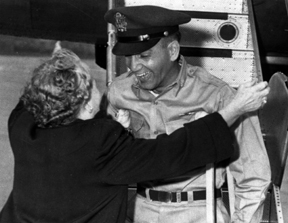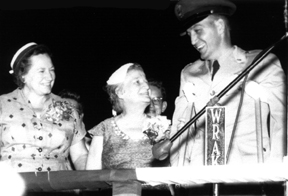 |
of Stardust Four Zero |
 |
|||||||||
|
Page 2 of 3 Pages |
|||||||||||
| The day we were to leave on the next leg of our flight home one of the most touching events of our journey took place. The Japanese employees of Tachikawa Air Base presented each of us with a large photograph of Mount Fuji. Each photograph bore an inscription in Japanese addressed to the individual crew member. There was an English translation attached which read, “May our Fujisan ever remind you of your visit to Far East Air Logistic Force and continued American - Japanese frienship.”
Our next stop was Honolulu, Hawaii. Those who arranged our trip thought we might like a day to rest and unwind before continuing on to our homes and families. As anxious as we were to get back, I think this was a wise decision and was one which we appreciated. Here we were provided with transportation and time to visit any of the sights we cared to see. I received special care. A former high school English teacher, whom I admired very much and who now lived with her family in Honolulu, invited me to dine with the family on the evening of my arrival. The following day she picked me up at the base and drove me on a first class tour of some of the island. From Honolulu we flew to Travis Air Force Base in California. This had been the jumping-off point when, as the aircraft commander of one of four crews, I had headed for Japan and my assignment to the 91st Squadron more than four years before. At Travis we were greeted by many people who had been concerned for us. Two very good friends, a man I'd trained with as an aviation cadet during WW II and his wife, had convinced the security personnel at the base that they really knew me and were allowed onto the flight line to meet the plane. I was very surprised and glad to see them, and especially pleased that they cared enough to deal with the obstacles they must have faced while seeking clearance onto the base. The next flight of our trip home was already set up, so our stay at Travis was short. Because our homes were scattered across the country, we were split into groups of three or four and each group was loaded aboard a separate plane. John Buck, whose promotion had come through making him Capt. Buck, was on a Convair with Gene Vaadi and me. Our first landing was in Tennessee where John's welcome-home committee was waiting. From there we headed for my stop, Olmsted Field at Harrisburg, PA. My family, friends, and many interested people I didn't know were waiting in the rain for my arrival. |
|||||||||||
| Though it was raining hard, very few people seemed to notice. My mother was at the bottom of the steps which had been wheeled up to the plane, and the rest of the clan was not far behind. Not heeding the rain, we all stood outside so long, engaged in our emotional reunion, that the Commanding General of Olmsted who had provided the official welcome became concerned and slipped his own trench coat over my shoulders — just one more of the kind and thoughtful acts we experienced along the entire route. |
|||||||||||
|
|||||||||||
| After a few questions from reporters, the plane left with Gene aboard, and I started on the final, sixty-mile leg of my journey in a car, one of several in a small caravan. The destination was Lewisburg, PA, where my mother resided with one of my sisters and her husband and daughter.
When we arrived at the house more people and reporters were waiting. It was tiring, but it was a great feeling to be among so many smiling and familiar faces. The first night home I could not sleep for even a minute. It was August and it was warm, but that wasn't my problem. Cell 37 was there every time I closed my eyes. My time with the other crew members hadn't been able to completely erase that specter. Now that the freedom I'd dreamed about so much in solitary was a reality, it was difficult to accept. It was only during the daytime that the realization of freedom caused less anxiety than had the anticipation. This may be difficult to understand unless one consideres that I was now never alone during the day — a good indication that family and f riends were accomplishing what they hoped to — making it easier for me. In fact, these kind people, some of whom traveled considerable distances, were so attentive that the dark thoughts soon faded, and I began to look forward to having my phycisal condition corrected. I needed a new leg. A day or two after I arrived home I began to tire from the steady pressure and constant activity. Happily, someone suggested a day at Half Way Dam, a nearby mountain camping area. As the cool forest breezes whispered through the pines, I slept on a cot. An unexpected and surprising event took place a couple of days after I arrived home. There was a parade in my honor. Organized in my hometown of Milton, PA, by my friends, it was complete with a convertible in which I was transported, military and musical marching units, and a reviewing stand. A high point in the events of the day consisted of four jet fighters which flashed low overhead just before the parade began. I learned later that I knew one of the pilots. He had been a B-29 co-pilot in the 91st before I was shot down. |
|||||||||||
| As my transportation at the head of the parade, moved slowly through the streets of Milton, I saw many people I knew and a lot I did not know. They waved and called out to me, and I shouted back. They seemed almost as happy to see me as I was to see them. I had considered the ring of Pennsylvania State Police around the car to be a truly flattering honor guard. However, I soon realized that, but for them, the whole thing would have quickly come apart. |
|||||||||||
|
|||||||||||
|
End of Page 2, Chapter 17 — Go to Page 3 You may go to Page — 1 — 2 — 3, this Chapter
Cover Page — Editor's Introduction — Dedication/Prologue Table of Contents — Mission Maps Chapters — 01 — 02 — 03 — 04 — 05 — 06 — 07 08 — 09 — 10 — 11 — 12 — 13 — 14 — 15 — 16 — 17 |
|||||||||||

